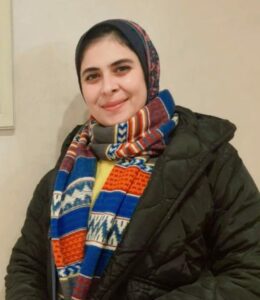
Interview with Eman Elgendy from Alexandria University (Egypt), on her past secondment at Université de Bordeaux and her upcoming mobility, under the supervision of Marc Landry.
First of all, can you tell us more about yourself? Where are you from, what is your university background?
My name is Eman Elgendy from Alexandria, Egypt, where my passion for science first took root. I completed my undergraduate studies with a dual specialization in Biochemistry and Chemistry, followed by a master’s degree in Neuroscience and Biotechnology through the EMN international program, all at Alexandria University. Currently, I am pursuing a PhD at the Molecular therapeutics lab in the Faculty of Science at Alexandria University, focusing on interdisciplinary research that connects molecular biochemistry with neuroscience to gain a deeper understanding of brain function and dysfunction.
Why did you choose this career path? What is your interest about science?
I chose this career path because I believe in Descartes’ principle, « Cogito, ergo sum, » meaning « I think, therefore I am. » My curiosity about cognition and why some people develop mental health disorders while others don’t have motivated me to study neuroscience. Also, through my academic journey, I have built a good foundation in theoretical knowledge and practical research skills that support my target, which I’m enthusiastic to further develop and apply throughout my career to improve understanding of brain disorders. My interest in science lies in uncovering the complex biological processes involved in early brain development to address critical health challenges in this critical period.
Can you tell us more about your mobility? Where did you go, for how long? On what kind of research were you working on? Who did you work with? Are you planning other secondments?
Although my mobility experiences have been limited, they have positively impacted me as if I had gained much more, helping me overcome shyness and seek new opportunities. During my master’s, I attended neuroscience schools and conferences lasting one to two weeks. However, the mobility experience that truly influenced me was during my PhD period through the PsyCoMed project, during which I spent two months at IMN (Institut des Maladies Neurodégénératives) at Bordeaux University, France, collaborating with Professor Marc Landry, the leader of the Purinergic-mediated Neuroinflammation and Brain Disorders team. This experience expanded my skills and perspectives, enhancing both my personal growth and my PhD project, which focuses on investigating the impact of environmental toxins and lifestyle on cognitive function, especially on the development of ADHD and pain comorbidity in progeny, with a particular emphasis on neuroinflammation. We also published a scientific paper with Prof. Landry based on my master’s work. I am now preparing for a three-month second mobility at Professor Landry’s lab to further broaden my expertise and network, hoping it will be as productive and impactful as my first.
Same question, but for people who don’t understand a thing about neuroscience (#PsyCoMedfordummies)
It was meaningful experience to get the chance to spend two months at IMN working with a team led by Professor Marc Landry as part of the PsyCoMed project. There, I learnt new skills and techniques which supported my PhD target on how maternal exposure to the environmental toxins and lifestyle can affect brain development, potentially causing attention and pain issues in the upcoming generations. This helps us figure out how to keep our brains healthy or develop new strategies for brain-related disorders.
What will your research bring to people and to society in general?
My research helps us understand how things like surroundings and maternal daily habits can affect brain development in progeny and lead to conditions like attention difficulties (ADHD) and pain. By learning more about how these problems start and identifying behavioral and molecular markers, we can find better ways to prevent or treat them early on. Ultimately, these findings could inform improved prevention strategies, enhance clinical outcomes, and contribute to a better quality of life for affected individuals and their families, thereby reducing the societal burden of these disorders.
How do you feel being part of a MSCA Staff Exchange project? What are the benefits of such mobility? What are the results of your secondment?
Being part of an MSCA Staff Exchange project has been significantly and immensely valuable, allowing me to collaborate internationally, share knowledge, and access unique resources. This mobility broadened my scientific perspectives and fostered connections with leading experts, which impacted my personality and thinking. From my secondments, I have produced a co-authored publication, expanded methodological skills, and learnt new lab techniques.
Do you already have future projects you want to share with us?
Yes, our lab has an upcoming project that will build on my current research, focusing on a key protein involved in how environmental toxins affect brain function related to ADHD and pain. I’m excited about the potential impact this research could have on improving our understanding in this area.
Do you have a recommendation/an advice for future potential MSCA fellows?
My advice would be to embrace the opportunity fully, be open to new ideas, cultures, and collaborations. Mobility is not just about research; it’s about personal growth and building a global network. Prepare well, communicate clearly, and stay curious. These experiences will greatly enrich your career and broaden your horizons.